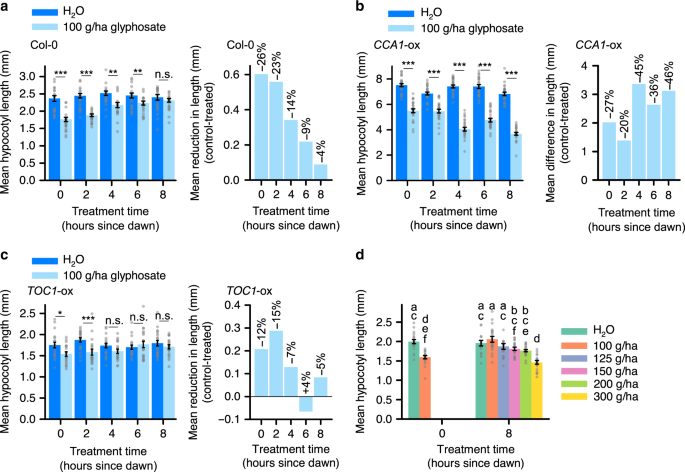Bogweevil
Member
the herbicidal effectiveness of glyphosate can depend upon the time of day of application5,6,7,8. One mechanism that influences the timing of responses of plants to their environment is the circadian clock. Circadian rhythms are biological cycles with a period of about 24 h that persist in the absence of external cues. In plants, circadian rhythms are generated by a series of interlocked transcription-translation loops and posttranslational mechanisms that are known collectively as the circadian oscillator. ... We reasoned that pervasive circadian regulation in plants might underlie rhythmic responses to certain chemical applications, and tested this notion for glyphosate-based herbicides due to their widespread use. This is an important question, because rhythmic responses of plants to agrochemicals introduce novel opportunities to refine or reduce agrochemical use.
We identified daily fluctuations in the effective dose of glyphosate. Increasing the dusk glyphosate concentration to 150 g/ha caused an equivalent reduction in hypocotyl length as 100 g/ha at dawn (Fig. 1d). Therefore, using the decrease in hypocotyl length as a measure of glyphosate effectiveness, 1.5 times more glyphosate was required at dusk to have the same effectiveness as at dawn. This suggests that plant growth is less sensitive to a dusk glyphosate application.

 www.nature.com
www.nature.com
We identified daily fluctuations in the effective dose of glyphosate. Increasing the dusk glyphosate concentration to 150 g/ha caused an equivalent reduction in hypocotyl length as 100 g/ha at dawn (Fig. 1d). Therefore, using the decrease in hypocotyl length as a measure of glyphosate effectiveness, 1.5 times more glyphosate was required at dusk to have the same effectiveness as at dawn. This suggests that plant growth is less sensitive to a dusk glyphosate application.

Plant circadian rhythms regulate the effectiveness of a glyphosate-based herbicide - Nature Communications
Glyphosate is the world’s most widely-used herbicide. Here, Belbin et al. show that plant responses to glyphosate, and therefore herbicide activity, depend on plant circadian rhythms suggesting that considering the time-of-day of application could lead to more efficient agrochemical use.





